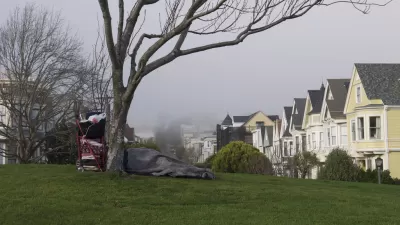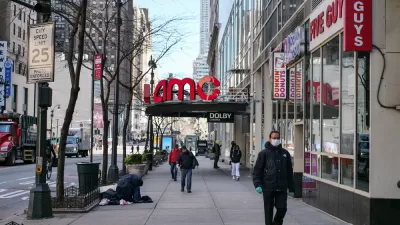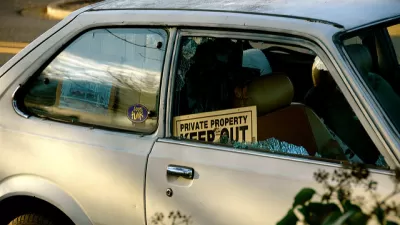San Francisco's Proposition Q, up for vote this November, would place additional limits on homeless camping in the city.

In a city well-known for its wealth inequality, the support of an anti-homeless camping proposition by multiple tech billionaires and millionaires is raising some eyebrows. Julia Carrie Wong of The Guardian reports that the campaign for Proposition Q has received over half of it's "campaign war chest" from just three tech billionaires, with smaller donations being received from other tech investors and employees including the husband of Yahoo! CEO Marissa Mayer. Wong notes that while the proposition gives police the ability to remove homeless tents from the sidewalk after 24 hours, it does not increase funding for shelters or other housing options.
The proposed law would amend the city’s police code to ban tent encampments on city sidewalks. The city would be required to offer residents of an encampment 24 hours’ notice and a shelter bed or a bus ticket out of town, before being authorized to confiscate their tents and other belongings. The city would be required to store those belongings for up to 90 days.
As Wong reports, a report released earlier this year by the city's budget analyst found that while $20 million has gone toward enforcement of the city's 36 quality of life laws, the population of the city's "unsheltered homeless" has continued to increase.
FULL STORY: Wealthy San Francisco tech investors bankroll bid to ban homeless camps

Alabama: Trump Terminates Settlements for Black Communities Harmed By Raw Sewage
Trump deemed the landmark civil rights agreement “illegal DEI and environmental justice policy.”

Study: Maui’s Plan to Convert Vacation Rentals to Long-Term Housing Could Cause Nearly $1 Billion Economic Loss
The plan would reduce visitor accommodation by 25% resulting in 1,900 jobs lost.

Planetizen Federal Action Tracker
A weekly monitor of how Trump’s orders and actions are impacting planners and planning in America.

Waymo Gets Permission to Map SF’s Market Street
If allowed to operate on the traffic-restricted street, Waymo’s autonomous taxis would have a leg up over ride-hailing competitors — and counter the city’s efforts to grow bike and pedestrian on the thoroughfare.

Parklet Symposium Highlights the Success of Shared Spaces
Parklets got a boost during the Covid-19 pandemic, when the concept was translated to outdoor dining programs that offered restaurants a lifeline during the shutdown.

Federal Homelessness Agency Places Entire Staff on Leave
The U.S. Interagency Council on Homelessness is the only federal agency dedicated to preventing and ending homelessness.
Urban Design for Planners 1: Software Tools
This six-course series explores essential urban design concepts using open source software and equips planners with the tools they need to participate fully in the urban design process.
Planning for Universal Design
Learn the tools for implementing Universal Design in planning regulations.
Caltrans
Smith Gee Studio
Institute for Housing and Urban Development Studies (IHS)
City of Grandview
Harvard GSD Executive Education
Toledo-Lucas County Plan Commissions
Salt Lake City
NYU Wagner Graduate School of Public Service





























